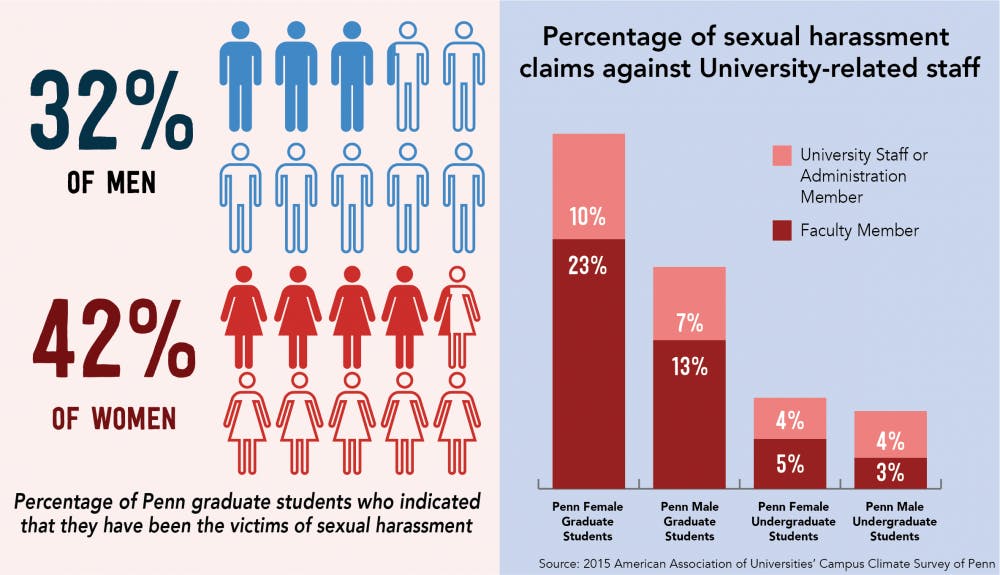
Five Graduate School of Education students have started a petition to improve sexual harassment policies within their school after students have called attention to instances of sexual harassment by faculty.
First publicized last month by Graduate Employees Together-University of Pennsylvania, a group of graduate students who have been working to become recognized as a union, the petition addressed GSE Dean Pam Grossman and called for her to “inform the GSE community as soon as possible about actions [she has] taken or [plans] to take to ensure that GSE students are safe from sexual harassment.”
The petition cited the 2015 Association of American Universities Campus Climate Survey, in which 42.4 percent of female Penn graduate students who filled out the survey reported being the victims of sexual harassment. (Close to 28 percent of the total female graduate population completed the survey.)
Graduate students were more likely than undergraduate students to identify faculty members as offenders.
"Especially for graduate students who work for Penn, the power and supervisory role of faculty can make reporting difficult and retaliation a serious threat," the petition reads.
Miranda Weinberg, one of the petition's authors and a Ph.D. student in GSE, said that when she spoke to graduate students in GSE about workplace issues, many students spoke about being sexually harassed by professors. These students found reporting procedures for these incidents unclear and expressed doubts that such reports would be kept confidential.
“One of the things that kept coming up was stories of harassment by professors targeting graduate students,” said Weinberg, who is also a GET-UP member. “We wanted to address that because we think it’s unacceptable.”
The petition currently has 92 signatures from Penn students, faculty and alumni.
GSE's sexual harassment policies are not different from any other graduate or undergraduate school at Penn. The University has a standard set of sexual harassment policies that remains largely the same across all schools, and investigations for violations of this policy are outside of the GSE's purview.
Fellow GSE Ph.D. student and petition writer Mark Lewis noted the standardized policies, but said that the petition is more focused on GSE students.
“When we sought to address issues within GSE, we were concerned about what is the footprint of these policies at GSE, how are they implemented at GSE, who do people go to within GSE when they’re reporting a case and how is that going to be resolved,” Lewis said.
Lewis and Weinberg both said inadequate sexual harassment policies are problems for students at other Penn graduate schools as well. When GET-UP formed, the group collected statements from students who wished for better procedures to report workplace problems. One of the statements, written by a School of Arts and Sciences graduate student, documented how sexual harassment by a colleague in addition to a lack of confidence in University response to such reports led her to leave her Ph.D. program.

Associate Dean for Graduate Studies Eve Troutt Powell, who oversees Ph.D. programs across the School of Arts and Sciences, declined to comment on sexual harassment policies within her school.
Attempts to reach the spokespeople at Penn Law School, the School of Nursing and the Perelman School of Medicine with questions about their respective sexual harassment policies were redirected to University spokesperson Ron Ozio, who emailed back with a link to Penn's general sexual harassment policy.
On Sept. 25, a few days after the GET-UP petition initially circulated, Grossman emailed the GSE community, including Ph.D. and masters students, reaffirming the existing sexual harassment reporting procedures despite Secretary of Education Betsy DeVos' decision to roll back the Obama administration's guidance on how universities should implement Title IX.
Grossman included in the letter a promise to establish mandatory sexual harassment training for all faculty and staff at GSE starting this year.
“Penn GSE takes any accusation regarding sexual harassment extremely seriously, and we are committed to addressing and resolving any issues while engaging in fair processes to all parties,” spokesperson Kat Stein wrote in an emailed statement to The Daily Pennsylvanian.
Stein added that GSE follows all University policies for sexual harassment and believes "in operating with as much transparency as possible."
Although Grossman’s letter addressed all the initial concerns circulated in the petition, Lewis said this is only “the start of conversation” and that he is hoping to ensure student input on the content of the mandatory sexual harassment training and revisions to the reporting system.
“We want to make sure that students, in a powerful way, in a way that starts with New Student Orientation, receive the message that there is absolutely no tolerance for sexual harassment, and that the reporting structure is something they could trust,” Lewis said. “My suggestion, from me alone, would be that every step of the reporting process has a notification to students of what to do if they’re unsatisfied with that step.”
On Sept. 29, the GET-UP members sent a letter to Grossman with the petition and follow-up questions including clarifying how complaints are investigated after they have been received by Grossman’s staff. Members of the group later met with Grossman and Associate Dean of Penn GSE Matthew Hartley on Oct. 4 to discuss concerns around sexual harassment policies and reporting structures.
In a email sent out to the GSE community, GET-UP said that GSE administrators would be actively soliciting student feedback and that they "feel optimistic that Dean Grossman and Associate Dean Hartley are willing to take action to change sexual harassment policies with student input."
Weinberg also cited recent news reports of unaddressed sexual harassment by faculty as one of her motivations to advocate for clearer sexual harassment policies at GSE.
“There is a pattern of faculty members behaving inappropriately toward graduate students, in ways that are particularly upsetting because of the power imbalance between faculty and graduates,” she said. “We want to be sure that Penn is not the subject of the next one of these articles.”
The Daily Pennsylvanian is an independent, student-run newspaper. Please consider making a donation to support the coverage that shapes the University. Your generosity ensures a future of strong journalism at Penn.
Donate



